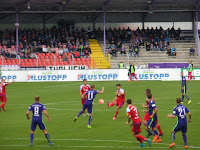"This is one, this is one I've waited for" sang those Mancunian funsters, well in terms of Groundhoping this is the one I've been waiting to visit since my trips to Germany became a regular thing.
 Why? Well I can't really put my finger on anything specific. Could it be the name, Erzgebirge Aue? Erzgebirge being the mountains within which the club is located. Could it be the city of Aue? The location is really awkward to get to as it is virtually on the border with the Czech Republic? Could it be the old stadium is about to undergo a "modernisation" programme? Maybe it's combination of all three.
Why? Well I can't really put my finger on anything specific. Could it be the name, Erzgebirge Aue? Erzgebirge being the mountains within which the club is located. Could it be the city of Aue? The location is really awkward to get to as it is virtually on the border with the Czech Republic? Could it be the old stadium is about to undergo a "modernisation" programme? Maybe it's combination of all three.Regardless, I left Leipzig at 7am where a bus replacement service (I learnt another German word this week - Ersatz) was waiting for me.
After being dropped off in the middle of nowhere (Neukieritzsch) I picked up the train to Zwickau (and met up with a mate of mine who had travelled from Munich) where another bus replacement was waiting to take us to another station to pick up the train to Aue (this week has destroyed any myth in my mind about German trains).
It is about a 20 minute walk from the main train station, all up hill too, to the ground. The ground is a bowl shaped arena, built into the valley. The views are stunning. The pitch is surrounding by an athletics track but that doesn't diminish the atmosphere, I am glad I opted for the terraces where the noise, led by a megaphone man, was fantastic.
The ground is a mix of standing and seating, with the most recent upgrade in 2010 when part of the terrace was covered and seated along with the installation of Schalke's old scoreboard. As mentioned, the ground is due to be "modernised" soon, with work due to start in the next few months and to be completed by 2017.
The club was founded as SG Aue in 1945 and in 1948 became BSG Pneumatik Aue after the local construction tool works. Further changes in sponsorship led to the club's name being changed to Zentra Wismut Aue (1949) and then to SC Wismut Aue (1951).
It was during this time though the club enjoyed it's most successful period, winning the GDR championship four times in 1955, 1956, 1957 and 1959, with an East German cup in 1955 thrown for good measure. This success also meant that Aue represented the GDR in the newly formed European Cup competition.
In 1963 though Karl Marx Stadt finally got a team to call its own, so Aue's team became BSG Wismut Aue. The club stayed in the GDR top flight until reunification, though they did not win another championship. The club changed name again in 1993 to their current name, to recognise the location of the club in the Erzgebirge mountains.
After the leagues merged the club spent the next decade or so in the lower reaches of German football before they won promotion to the 2.Bundesliga in 2003. The club was relegated in 2008, thus becoming a founder member of 3 Liga.
The club bounced back to the second level in 2010, but are now back in the third tier, after finishing 17th last season, where today they were taking Holstein Kiel, who I saw play at Energie Cottbus earlier in the week.
The game was an insipid affair that ended goalless, but I guess the visitors will be the happier of the two teams after earning a point on the road.
Post match we managed to find a superb brauhaus in the city centre, where a few beers were sunk, some great food was eaten and time was spent reflecting on another fantastic week of groundhopping in Germany.
 |
| The main man with the megaphone! |



























































